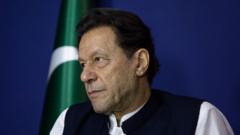The Pakistani government has halted the registration of religious seminaries, previously a strategy aimed at counterterrorism. The decision follows pressure from Islamist political parties and raises alarms over the unchecked influence of madrasas.
Political Backtrack: Pakistan Reverses Madrasa Registration Mandate

Political Backtrack: Pakistan Reverses Madrasa Registration Mandate
In a surprising political maneuver, the Pakistani government has abandoned plans to regulate madrasas, sparking concerns of increased radicalization.
In a controversial move, the government of Pakistan has decided to abandon its requirement for madrasas—religious seminaries often viewed by Western officials as potential breeding grounds for extremism—to register with the state. This decision comes amid rising tensions between the government and Islamist groups, casting doubts on progress made in regulating these institutions.
Madrasas have attracted millions of impoverished children by offering free education, meals, and housing. However, they have also been accused of fostering radical ideologies, with many former students reportedly joining groups like the Taliban and Al Qaeda. Hence, in a bid to curb such influences, the Pakistani government initiated a significant reform in 2019 that mandated these institutions to register with its Ministry of Education, ensuring greater state oversight.
Despite the backing of the military establishment for these reforms, Islamist parties vehemently opposed them. The situation reached a turning point in October 2024, when the largest Islamist party, Jamiat Ulema-e-Islam, brokered a deal with the government, resulting in the suspension of the registration requirement. Instead, madrasas are to operate under an antiquated colonial law that offers little in terms of oversight over their activities, curriculum, and funding.
In return, Jamiat Ulema-e-Islam has committed to supporting controversial constitutional amendments related to judicial appointments—another facet of Pakistan's intense political landscape. Observers are expressing alarm over the implications of this agreement, as it potentially signals a retreat from years of efforts to bring these unregulated institutions under government scrutiny.




















